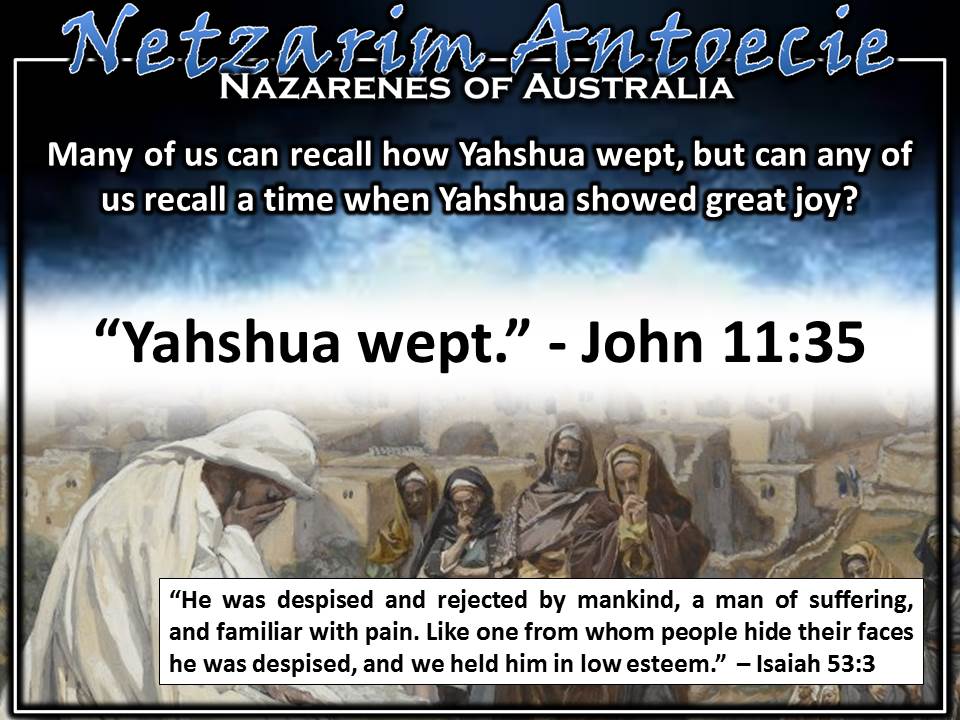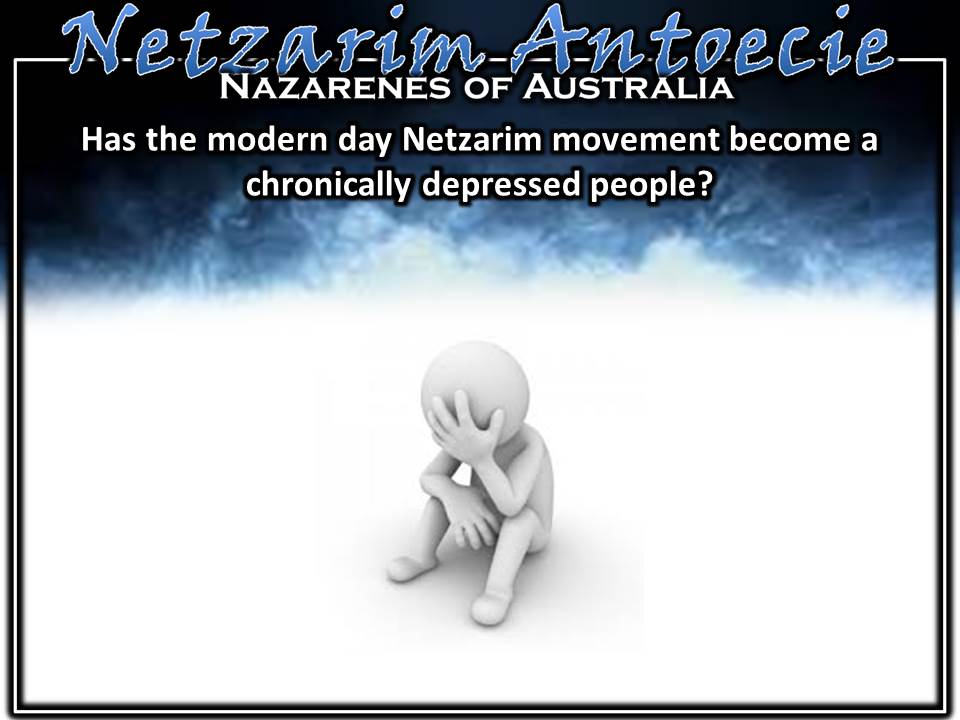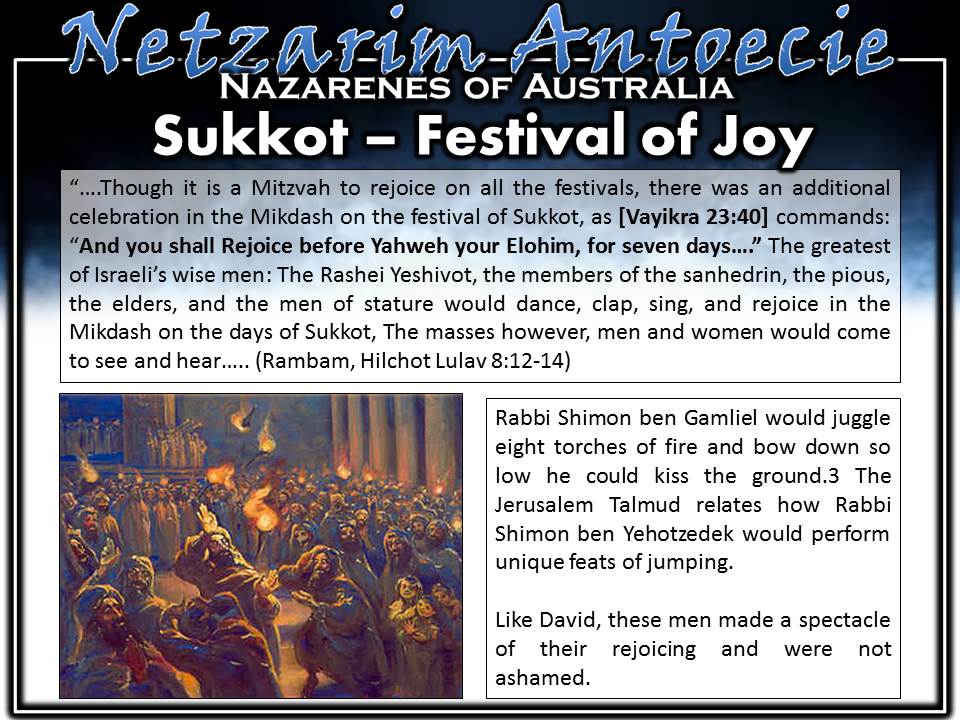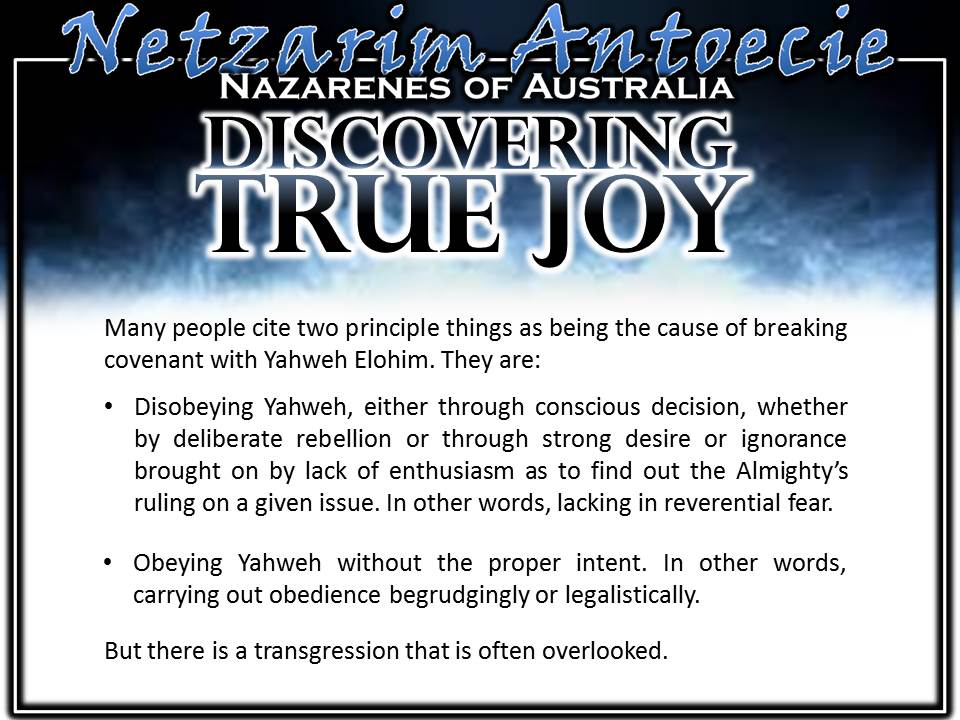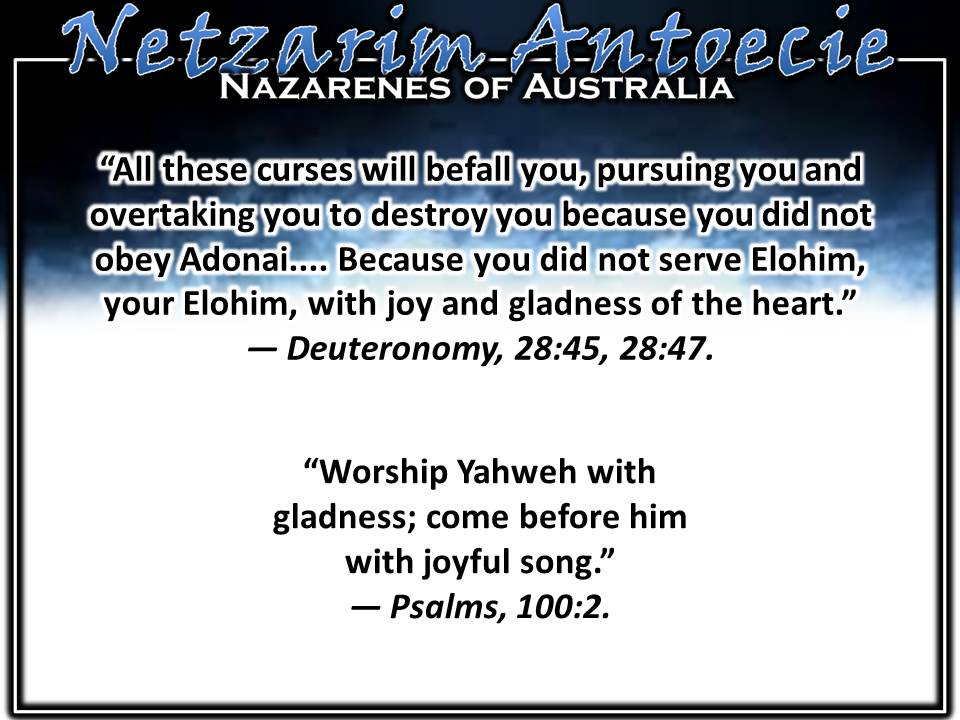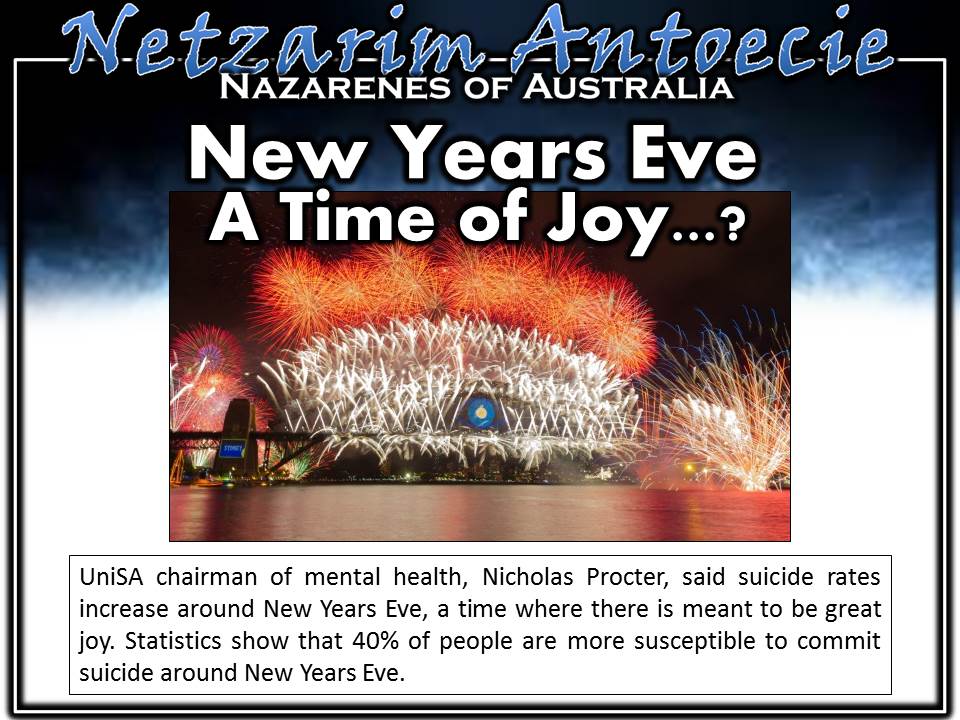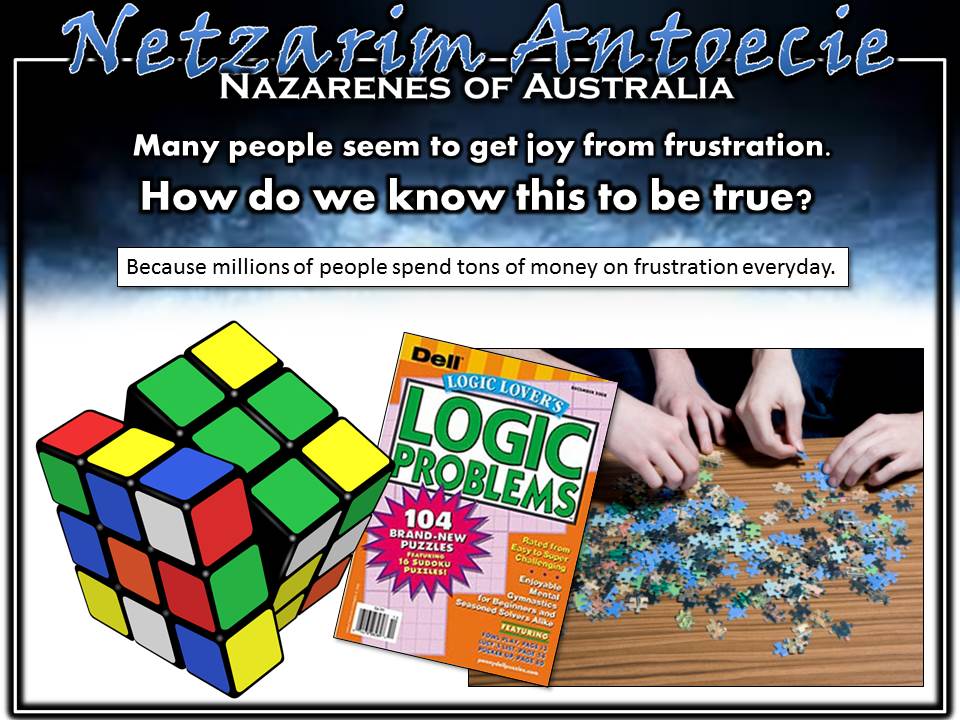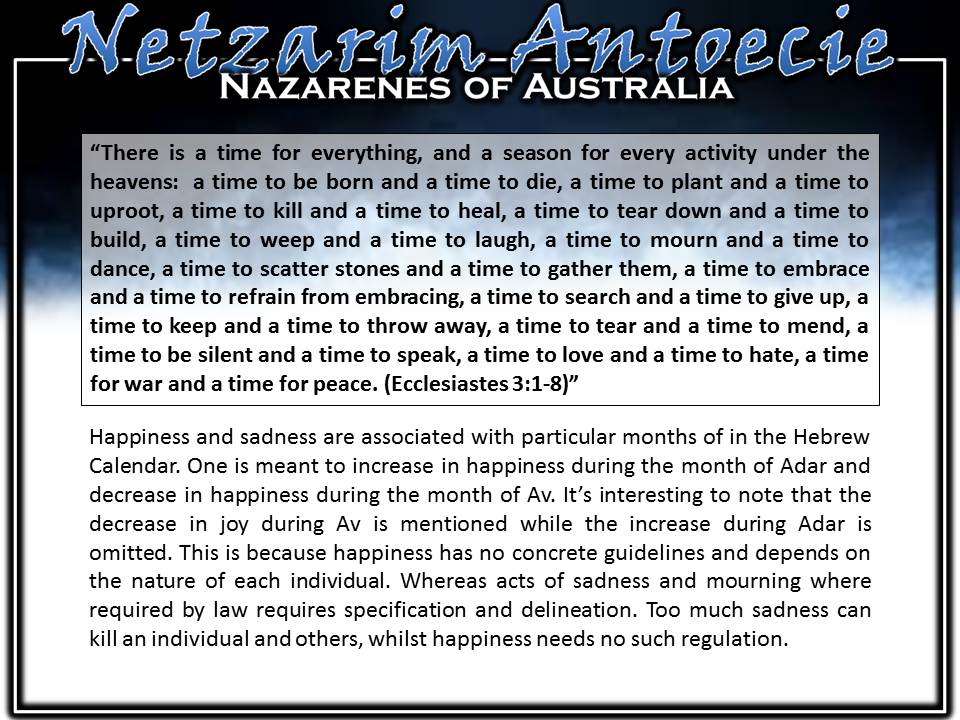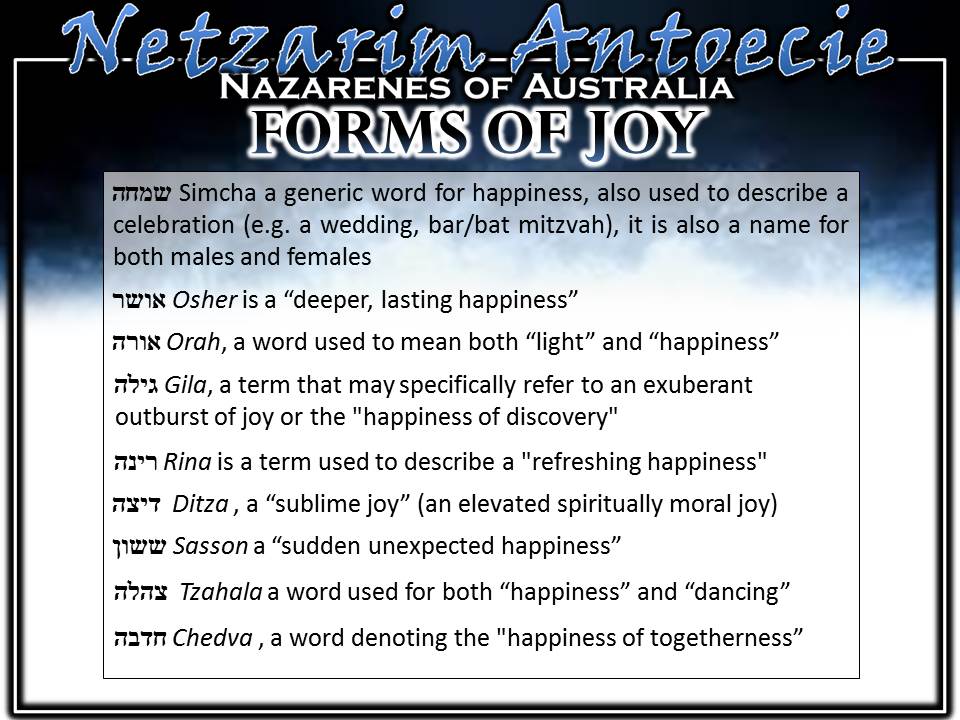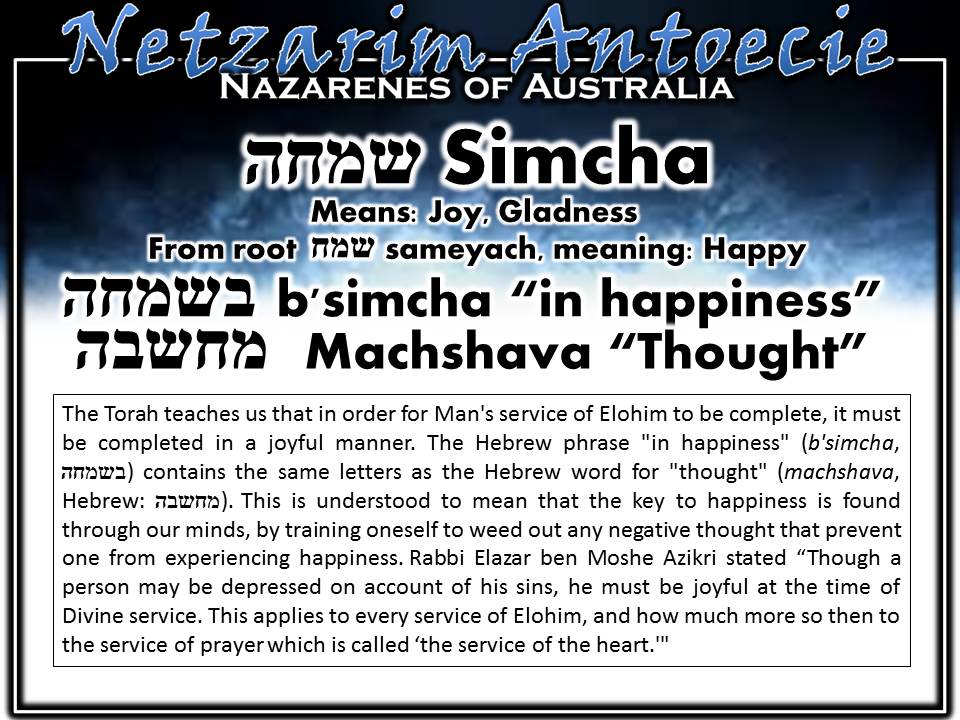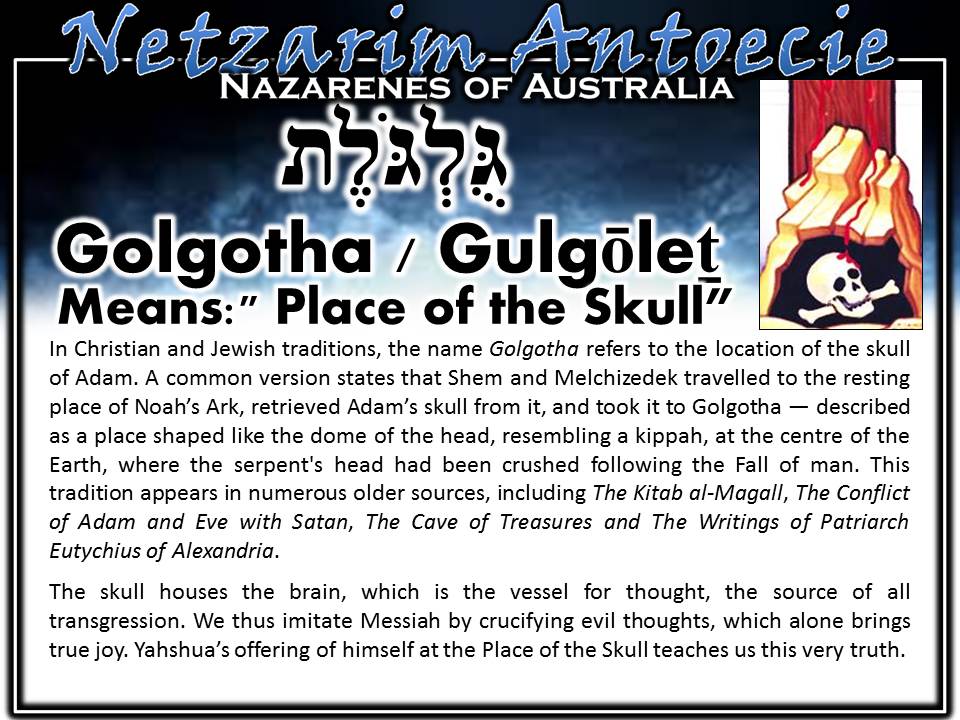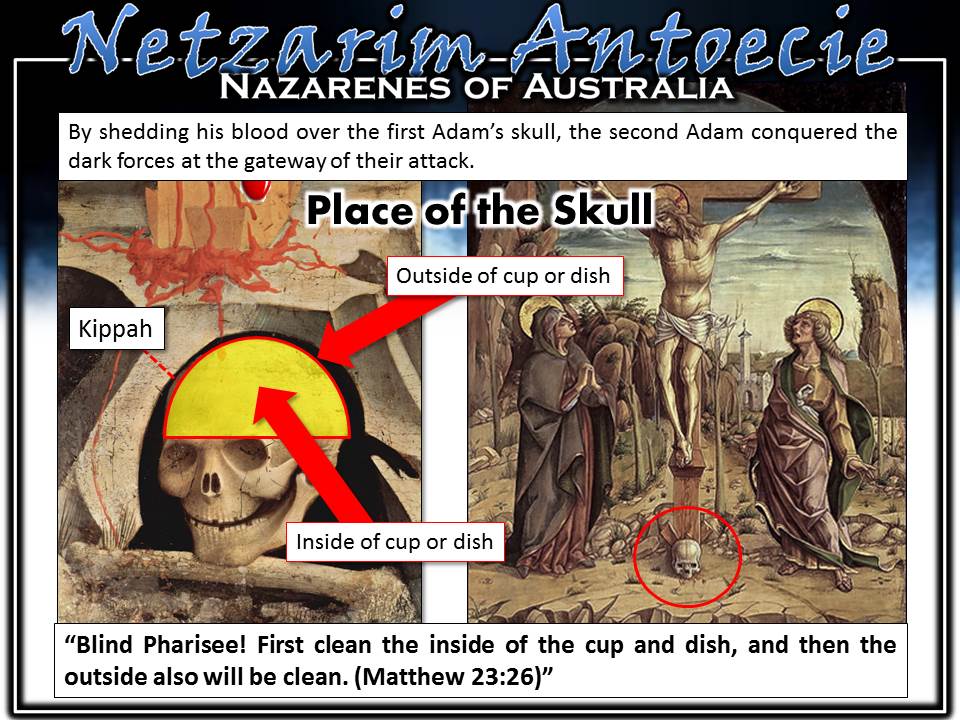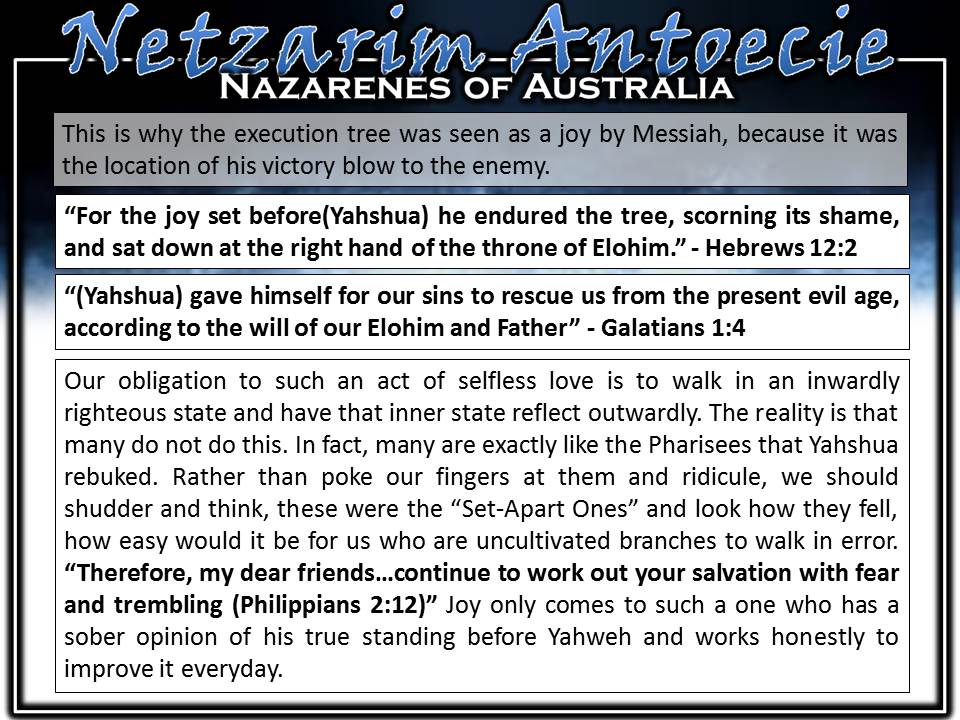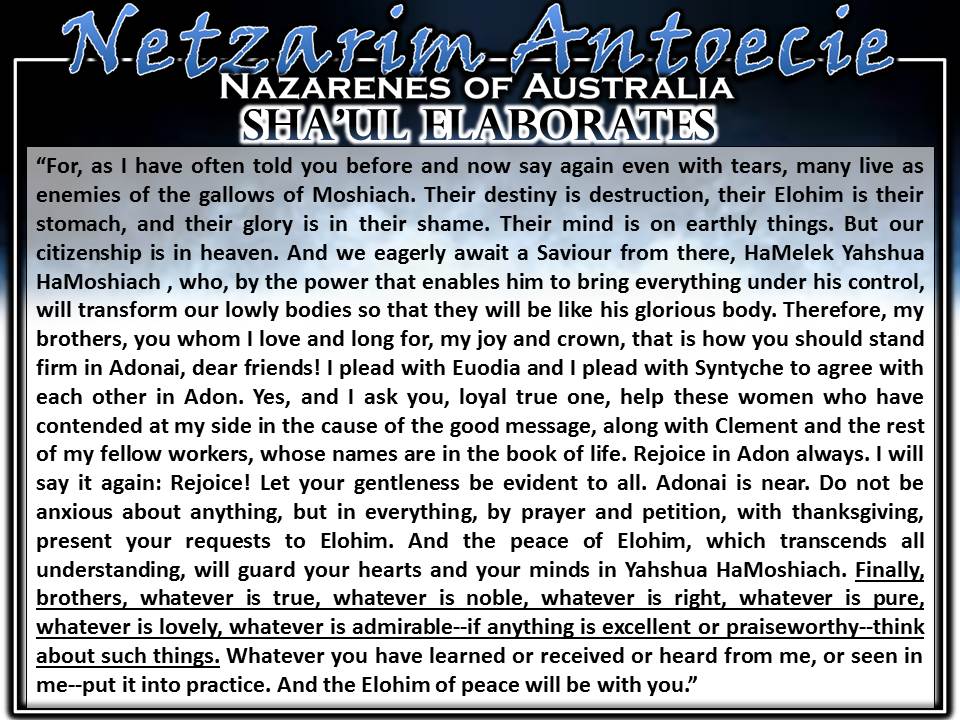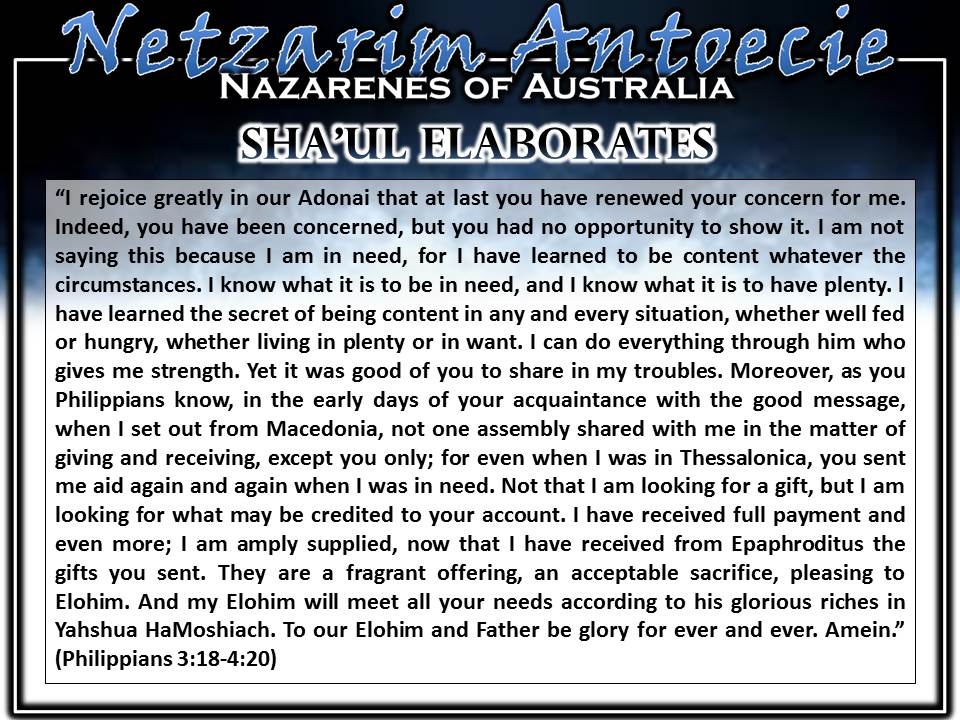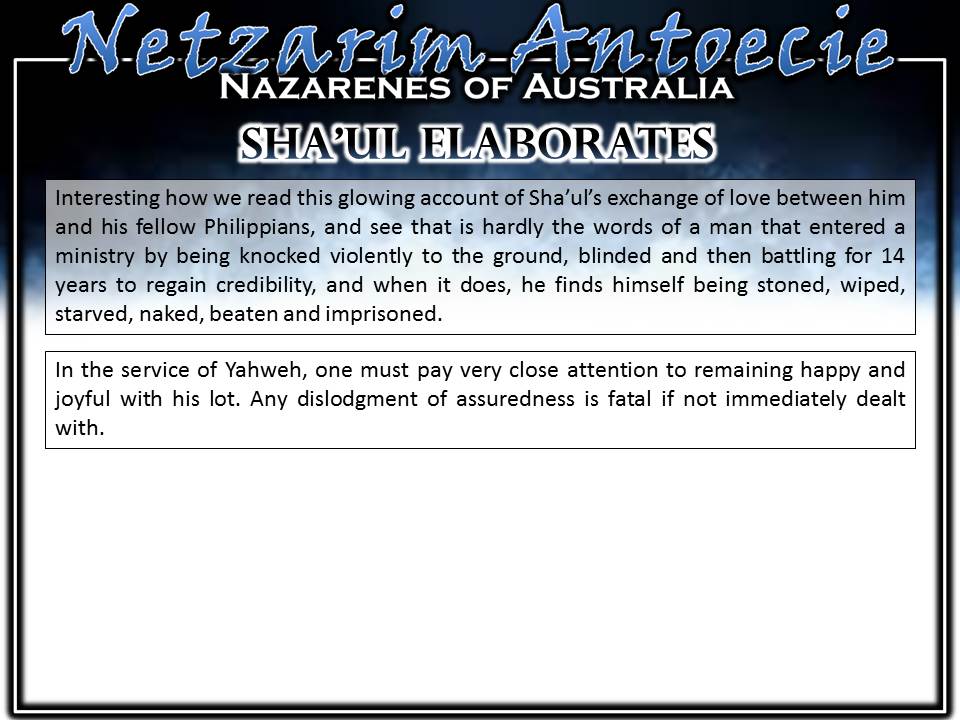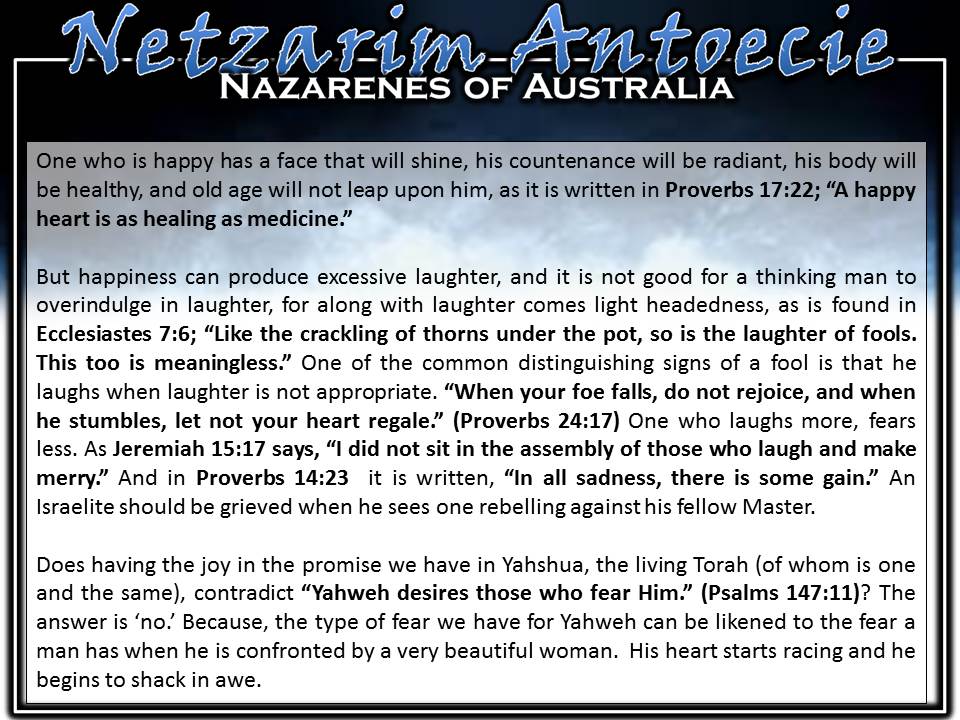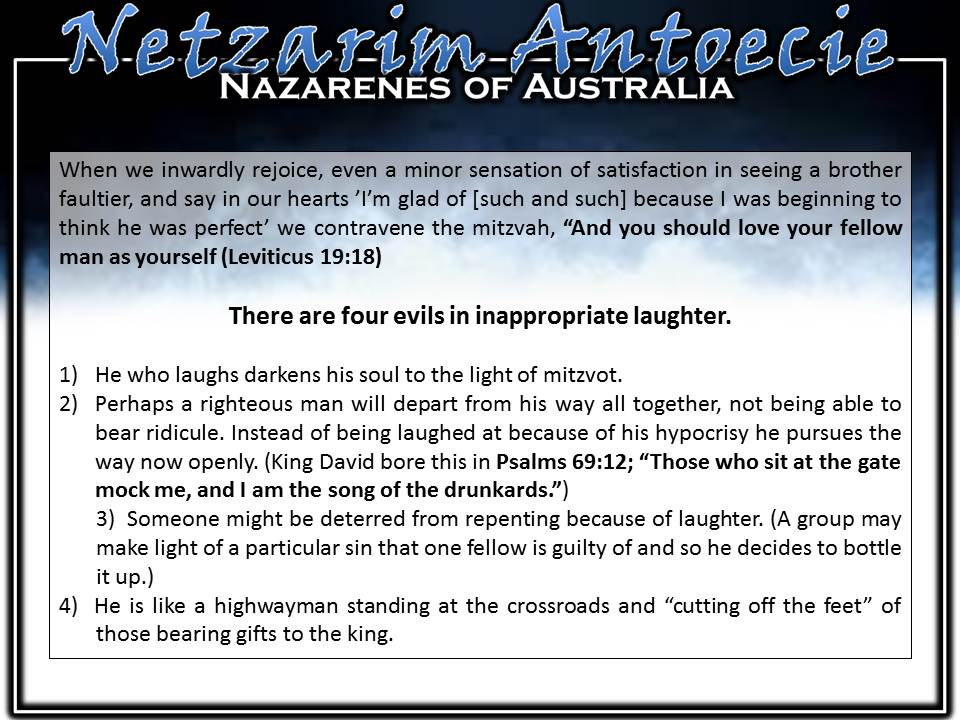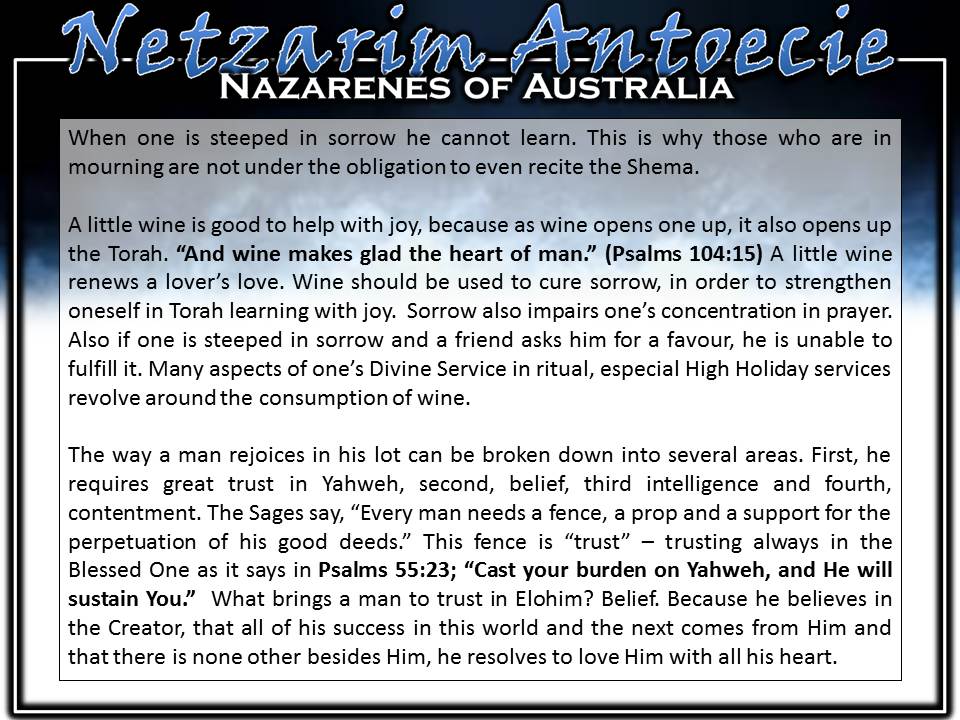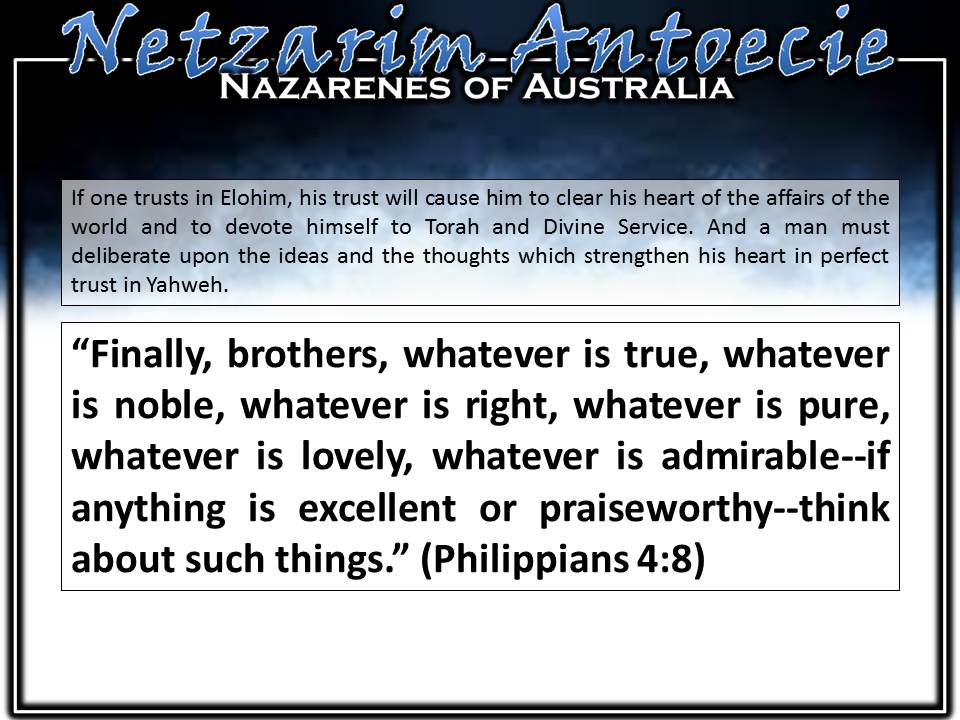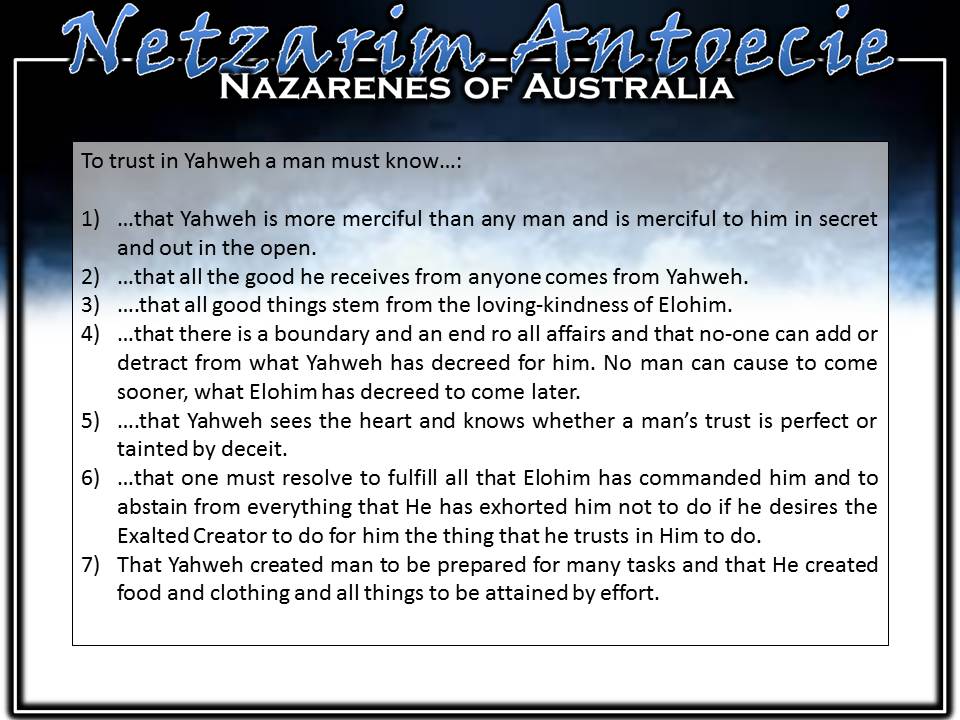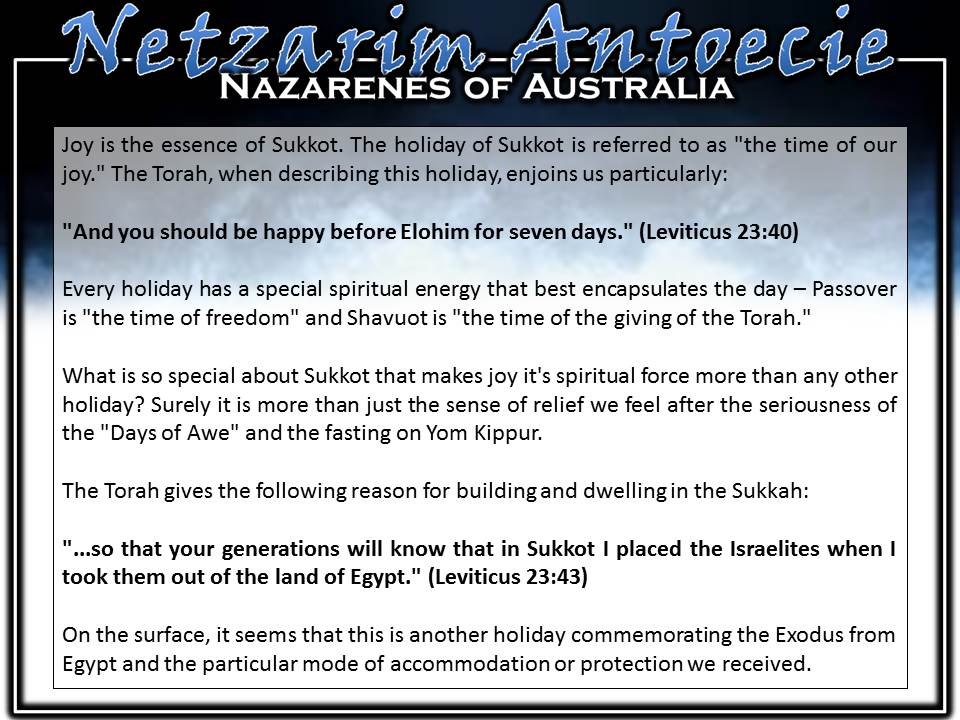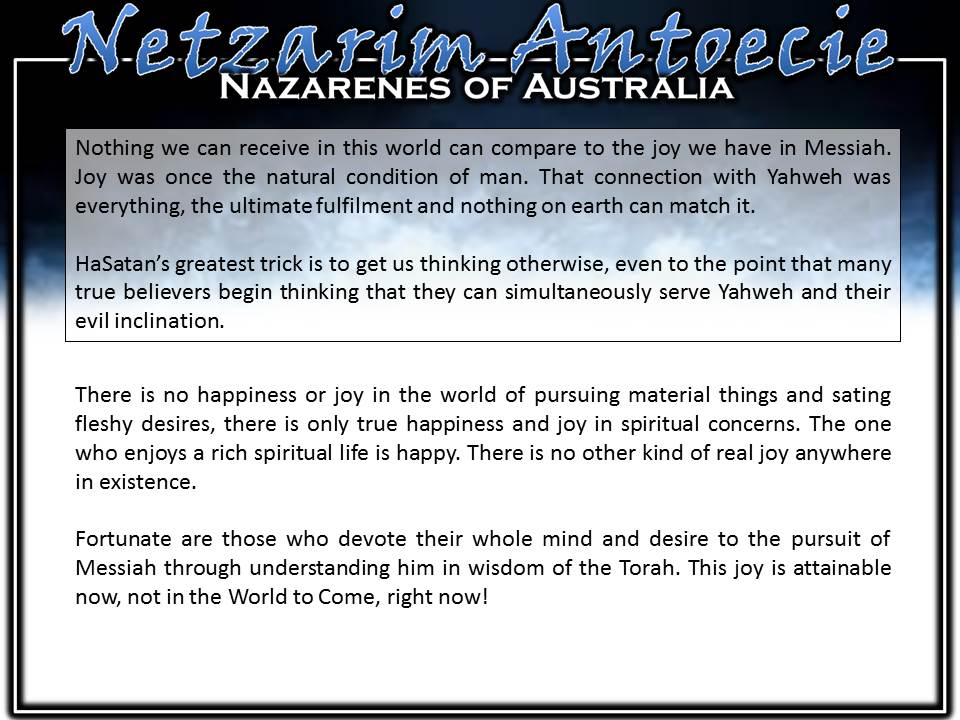Discovering True Joy By Elder Jason Jordan
Over the past year I’ve noticed a steady decline in enthusiasm and joy for daily Torah living in Messiah and a steady increase in doom and gloom thinking within the body of Moshiach. So what’s going on?
The enemy is on the warpath for your joy. It wants to infect it, remove it and destroy it. The enemy is powerless to form its own weapon and make a full-frontal assault on the community of Israel. Added to this the Nation of Israel is immortal and while it stands as a community it cannot be removed, but if the enemy divides and separates people away from the community, it can influence lost sheep to construct their own gallows.
King Messiah Yahshua said, “I am the gate; whoever enters through me will be saved. They will come in and go out, and find pasture. The thief comes only to steal and kill and destroy; I have come that they may have life, and have it to the full.” - John 10:9-10
The more I looked into the problem and really pressed into the core of the matter, I found a rather startling truth.
Many of us can recall how Yahshua wept, but can any of us recall a time when Yahshua showed great joy? We all know the shortest verse in Scripture, how “Yahshua wept,” but how many of us know a time when he was joyful? We read insights into his experience and the general reception of his ministry and somehow it adds to the weight of a sorry man on a sorry mission to rescue a sorry world. “He was despised and rejected by mankind, a man of suffering, and familiar with pain. Like one from whom people hide their faces he was despised, and we held him in low esteem.” – Isaiah 53:3
For too long we’ve portrayed the Messiah as a sorry soul, misinterpreting his cry “Why have you forsaken me!” and even interpreting his bitter cup incident in Gethsemane as a last minute request to get himself out of the supposed mess he was in. It doesn’t help that we’ve been intravenously fed images of him in a state of dying. The 2004 movie The Passion seemed to consist of 127 minutes of watching the Messiah get the stuffing kicked out of him with very little screen time devoted to the glorious power that he exhibited through the Father.
We’ve become people fixated on failure, rather than success.
You’d be forgiven for thinking that we, the Netzarim, the prophetic resurgence of Yah’s chosen people have become a cesspit of negativity and depression.
As we’ve looked at, the Feast of Sukkot is all about joy. That joy of knowing that Yahweh broke off the best piece of Himself and inserted it into our environment in the form of a man to save the lost sheep of the House of Israel. So we are in the closing moments of the Feast of Joy. How did you go? Where you able to look beyond the murkiness of your own personal struggles and the weight of the world’s collective preoccupation with mass self-destruction and find joy, real joy?
Even the Jewish Sages that many of us have been conditioned to look at as stuck up Pharisees, showed so much joy that they attracted countless onlookers to the Temple precincts. Like David, a man well acquainted with sorrow and hardship, they rejoiced with dance and spectacle before the Presence.
Yes Yahshua also rejoiced! He was overwhelmed with joy at seeing that the weak were given eyes to see, whilst the wise who had become conceited and arrogant in their understanding had become blind. “Yahshua rejoiced in the Ruach HaKodesh and said, ‘I praise you, Father, Adonai of heaven and earth, because you have hidden these things from the wise and intelligent, and revealed them to little children. Yes, Father, for this was your gracious will. – Luke 10:21
Why is joy so important? Many people cite two principle things as being the cause of breaking covenant with Yahweh Elohim. They are:
• Disobeying Yahweh, either through conscious decision, whether by deliberate rebellion or through strong desire or ignorance brought on by lack of enthusiasm as to find out the Almighty’s ruling on a given issue. In other words, lacking in reverential fear.
• Obeying Yahweh without the proper intent. In other words, carrying out obedience begrudgingly or legalistically.
But there is a transgression that is often overlooked.
“All these curses will befall you, pursuing you and overtaking you to destroy you because you did not obey Adonai.... Because you did not serve Elohim, your Elohim, with joy and gladness of the heart.” — Deuteronomy, 28:45, 28:47.
Worship Yahweh with gladness; come before him with joyful song.” — Psalms, 100:2.
Yahweh commands us to be joyful? Why? Because joy is a power! You have joy, you have power. When a salesman has joy, he moves his product. When a customer has a problem and an employee has joy, he comes in and the costumer's attitude immediately changes. A person who has joy changes the whole atmosphere of a room.
In 1997 staff of Pike Place Fish Market in Seattle began tossing trout and salmon through the air of the market providing high energy which energized many pedestrians passing by on their lunch breaks. They gave their complete attention to each customer and ensured each had an enjoyable visit. An entrepreneur noticed the actual work of selling fish was repetitive, cold and exhausting. It occurred to him that the fishmongers might not enjoy every part of their job, but they chose to bring joy to how they approached it. They also sold a lot of fish. He asked the fishmongers if he could film them and they agreed. The film became a training video for businesses all over the globe.
The only thing that changed this business around from being near closed to have a global impact and drawing customers and onlookers from all over the world was joy!
But how do we get joy? This is a big problem, because many of us don’t know what real joy is. Most people believe that true joy and happiness is having everything that we want. Since what we want costs money, the rich and successful are our benchmark for happiness.
Where do most people look for their joy? Is it sitting down to the game with mate’s joy? The pursuit of worldly joy without having spiritual reasoning behind it is a distraction from true joy. This doesn’t mean that following a football team or having a hobby is evil, heaven forbid. These activities for a believer keeps him anchored to the climate, allowing him to always be able to relate to his current audience and keeps him well rounded with the mundane and the profoundly Divine in his awareness. But sport as well as popular forms of entertainment without the insight they provide in one’s Torah learning keep a man distracted in an entertaining way until his death. It’s interesting to note that many serious soccer supporters often treat their fandom as a form of religion, which sometimes translates into a warped form of joy that escalates into rioting and street violence.
It’s further interesting to notes that New Year’s Eve, a time synonymous with joy, has the highest rate of suicides over any other time of the year. Is this how joy is meant to go?
In the Book of Ecclesiastes, King Solomon taught that joy is futile.
But it’s not till the concluding portion of this writing that we read his the entirety of his thought. “Now all has been heard; here is the conclusion of the matter: Fear Elohim and keep his commandments, for this is the duty of all mankind. (Ecclesiastes 12:13)” But what pleasure can we derive from fear? “And the Spirit of Yahweh shall rest upon Him, the Spirit of Wisdom and Understanding, the Spirit of Counsel and Might, the Spirit of Knowledge and of the Fear of Yahweh. And His delight shall be in the fear of Yahweh. (Isaiah 11:2-3)”
“Yahweh delights in those who fear him, who put their hope in his unfailing love. (Psalm 147:11)”
Yahweh regulates our joy as with all our other range of emotions according to his set times (Moadim). Here King Solomon enumerates a season for everything.
“There is a time for everything, and a season for every activity under the heavens: a time to be born and a time to die, a time to plant and a time to uproot, a time to kill and a time to heal, a time to tear down and a time to build, a time to weep and a time to laugh, a time to mourn and a time to dance, a time to scatter stones and a time to gather them, a time to embrace and a time to refrain from embracing, a time to search and a time to give up, a time to keep and a time to throw away, a time to tear and a time to mend, a time to be silent and a time to speak, a time to love and a time to hate, a time for war and a time for peace. (Ecclesiastes 3:1-8)”
Here King Solomon is enumerating the spectrum of human emotion according to the Set Times as handed down by Yahweh. There is a time to be born – Shacharit (morning prayers) and time to die – Kriyat Shema (Bedtime Prayers), There is a time to plant - Tu B'Shevat (the Year of the new tree), a time to uproot, kill and tear down - Shavuot (the Harvest Festival), a time to heal and weep - Tisha B'Av (the ninth day), a time to laugh and dance, Simchat HaTorah (The Joy of the Torah), there is a time to search and speak - The Month of Elul, there is a time to mend - Yamim Noraim (the Ten Days of Awe), there is a time to be silent – The Amidah (The Standing Prayer), there is a time to hate and throw away - Tashlich (to cast), there is a time to for war – Chanukah (Feast of Dedication) and a time for peace – Shabbat.
In Scripture there are many forms of Joy. The primary Joy, Simcha, contains some interesting facets.
The Torah teaches us that in order for Man's service of Elohim to be complete, it must be completed in a joyful manner. The Hebrew phrase "in happiness" (b'simcha, בשמחה) contains the same letters as the Hebrew word for "thought" (machshava, Hebrew: מחשבה). This is understood to mean that the key to happiness is found through our minds, by training oneself to weed out any negative thought that prevent one from experiencing happiness. Rabbi Elazar ben Moshe Azikri stated “Though a person may be depressed on account of his sins, he must be joyful at the time of Divine service. This applies to every service of Elohim, and how much more so then to the service of prayer which is called ‘the service of the heart.'"
The mind and the heart are to merge as one, but it is as if the heart rises up into the cavity of the mind, a place that should permeate with joy. It’s no wonder that HaSatan hit’s hardest at the mind. By disabling the mind and flaring the heart, HaSatan, can get a man to be led by the desires of heart and use his mind to cover and support the movement of this desire devouring organ. It is therefore for this reason that the serpent’s head was struck.
In Christian and Jewish traditions, the name Golgotha refers to the location of the skull of Adam. A common version states that Shem and Melchizedek travelled to the resting place of Noah’s Ark, retrieved Adam’s skull from it, and took it to Golgotha — described as a place shaped like the dome of the head, resembling a kippah, at the centre of the Earth, where the serpent's head had been crushed following the Fall of man. This tradition appears in numerous older sources, including The Kitab al-Magall, The Conflict of Adam and Eve with Satan, The Cave of Treasures and The Writings of Patriarch Eutychius of Alexandria.
The skull houses the brain, which is the vessel for thought, the source of all transgression. We thus imitate Messiah by crucifying evil thoughts, which alone brings true joy. Yahshua’s offering of himself at the Place of the Skull teaches us this very truth.
Anyone who wears a kippah or a yarmulke, whether they like it or not, testifies to the victory of King Messiah Yahshua at Golgotha, the top of the head, the dome, the skull.
Rav Sha’ul, a Benoni, an intermediate one, also speaks extensively on joy.
“For, as I have often told you before and now say again even with tears, many live as enemies of the gallows of Moshiach. Their destiny is destruction, their Elohim is their stomach, and their glory is in their shame. Their mind is on earthly things. But our citizenship is in heaven. And we eagerly await a Saviour from there, HaMelek Yahshua HaMoshiach , who, by the power that enables him to bring everything under his control, will transform our lowly bodies so that they will be like his glorious body. Therefore, my brothers, you whom I love and long for, my joy and crown, that is how you should stand firm in Adonai, dear friends! I plead with Euodia and I plead with Syntyche to agree with each other in Adon. Yes, and I ask you, loyal true one, help these women who have contended at my side in the cause of the good message, along with Clement and the rest of my fellow workers, whose names are in the book of life. Rejoice in Adon always. I will say it again: Rejoice! Let your gentleness be evident to all. Adonai is near. Do not be anxious about anything, but in everything, by prayer and petition, with thanksgiving, present your requests to Elohim. And the peace of Elohim, which transcends all understanding, will guard your hearts and your minds in Yahshua HaMoshiach. Finally, brothers, whatever is true, whatever is noble, whatever is right, whatever is pure, whatever is lovely, whatever is admirable--if anything is excellent or praiseworthy--think about such things. Whatever you have learned or received or heard from me, or seen in me--put it into practice. And the Elohim of peace will be with you. “I rejoice greatly in our Adonai that at last you have renewed your concern for me. Indeed, you have been concerned, but you had no opportunity to show it. I am not saying this because I am in need, for I have learned to be content whatever the circumstances. I know what it is to be in need, and I know what it is to have plenty. I have learned the secret of being content in any and every situation, whether well fed or hungry, whether living in plenty or in want. I can do everything through him who gives me strength. Yet it was good of you to share in my troubles. Moreover, as you Philippians know, in the early days of your acquaintance with the good message, when I set out from Macedonia, not one assembly shared with me in the matter of giving and receiving, except you only; for even when I was in Thessalonica, you sent me aid again and again when I was in need. Not that I am looking for a gift, but I am looking for what may be credited to your account. I have received full payment and even more; I am amply supplied, now that I have received from Epaphroditus the gifts you sent. They are a fragrant offering, an acceptable sacrifice, pleasing to Elohim. And my Elohim will meet all your needs according to his glorious riches in Yahshua HaMoshiach. To our Elohim and Father be glory for ever and ever. Amein.” (Philippians 3:18-4:20)
Interesting how we read this glowing account of Sha’ul’s exchange of love between him and his fellow Philippians, and see that is hardly the words of a man that entered a ministry by being knocked violently to the ground, blinded and then battling for 14 years to regain credibility, and when it does, he finds himself being stoned, wiped, starved, naked, beaten and imprisoned.
In the service of Yahweh, one must pay very close attention to remaining happy and joyful with his lot. Any dislodgment of assuredness is fatal if not immediately dealt with.
One who is happy has a face that will shine, his countenance will be radiant, his body will be healthy, and old age will not leap upon him, as it is written in Proverbs 17:22; “A happy heart is as healing as medicine.”


